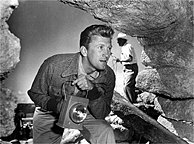Journalism 101 at The Times
In an article today on the Lebanese elections, the New York Times performed what seemed only two days ago to be an unimaginable feat. It did not adopt the terrorist propaganda term of art "resistance" in referring to the terrorist group Hezbollah.
Isn't that remarkable? They actually acted as journalists today, not as terrorist propagandists.
The Times today put the self-glorifying term within quotes in a deck below the headline--in the print edition; it doesn't appear online--and did not repeatedly adopt the term, as did the Times' Hassan Fattah in an article on Sunday.
Today, Times reporter John Kifner said the election had become "a virtual referendum on 'the resistance' - that is, keeping Hezbollah's weapons along the tense border with Israel."
Contrast that with the report from Fattah on Sunday. As we commented at the time, Fattah wore his bias on his sleave and repeatedly parrotted Hezbollah and others in their self-glamorizing use of that word, tacitly endorsing it. Fattah also told us about "the patina of heroism that it [Hezbollah] earned in the 23 years of Israelis occupation of the south." Kifner, by contrast, said, "In Lebanon, Hezbollah has an almost mythic heroic status."
It's tasteless to associate the word "heroic" with this a band of murderers whose idea of "heroism" was to kidnap AP Bureau Chief Terry Anderson and slaughter 241 U.S. Marines in their beds. But if one must do so, there is an immense difference between reporting the sentiments in Lebanon and adopting those sentiments, as Fattah did in his article.
Kifner's article reads almost as a Journalism 101 lesson to Fattah--who can use one, to say the least.
What I wonder is whether A) the Times was responding to reader emails, B) noticed the problem in Fattah's piece on its own and made a point of correcting it in Kifner's story--or, worst of all, C) simply gives reporters latitude to be either fair and accurate or inaccurate or biased. Any regular reader of the Times wouldn't hesitate to choose C.
Isn't that remarkable? They actually acted as journalists today, not as terrorist propagandists.
The Times today put the self-glorifying term within quotes in a deck below the headline--in the print edition; it doesn't appear online--and did not repeatedly adopt the term, as did the Times' Hassan Fattah in an article on Sunday.
Today, Times reporter John Kifner said the election had become "a virtual referendum on 'the resistance' - that is, keeping Hezbollah's weapons along the tense border with Israel."
Contrast that with the report from Fattah on Sunday. As we commented at the time, Fattah wore his bias on his sleave and repeatedly parrotted Hezbollah and others in their self-glamorizing use of that word, tacitly endorsing it. Fattah also told us about "the patina of heroism that it [Hezbollah] earned in the 23 years of Israelis occupation of the south." Kifner, by contrast, said, "In Lebanon, Hezbollah has an almost mythic heroic status."
It's tasteless to associate the word "heroic" with this a band of murderers whose idea of "heroism" was to kidnap AP Bureau Chief Terry Anderson and slaughter 241 U.S. Marines in their beds. But if one must do so, there is an immense difference between reporting the sentiments in Lebanon and adopting those sentiments, as Fattah did in his article.
Kifner's article reads almost as a Journalism 101 lesson to Fattah--who can use one, to say the least.
What I wonder is whether A) the Times was responding to reader emails, B) noticed the problem in Fattah's piece on its own and made a point of correcting it in Kifner's story--or, worst of all, C) simply gives reporters latitude to be either fair and accurate or inaccurate or biased. Any regular reader of the Times wouldn't hesitate to choose C.


<< Home